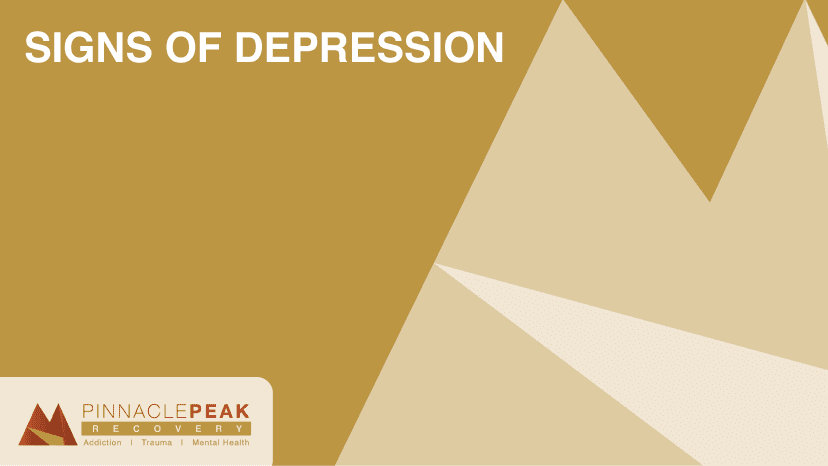“If someone asks you how you are, you are meant to say fine. You are not meant to say that you cried yourself to sleep last night because you hadn’t spoken to another person for two consecutive days. Fine is what you say.”
― Gail Honeyman
Depression is something that impacts people of all ages, genders, socioeconomic statuses, and more. It doesn’t discriminate. In fact, more than 1 in 6 Arizona residents are impacted by depression. This means there’s a high chance you know someone who’s living with it, whether it’s obvious or not.
Maybe that person is you.
Mental health conditions, like depression, aren’t always as obvious as some might think. The condition itself often encourages those dealing with it to hide their symptoms as much as possible. This makes it that much harder for someone to seek help, or for loved one’s to know that their family member or friend is hurting.
Our team at Pinnacle Peak Recovery has seen how depression can truly impact a community. We believe everyone should have access to mental health care, but this often can’t be done if the person doesn’t know they need care in the first place. Today we’re going to talk about the signs of depression, what they mean, and how you can take the steps to address them.
What Is Depression?
At its core, the term “depress” means “to sadden.” Most people have experienced periods of intense sadness. It can feel suffocating, demotivating, and never-ending all at once.
Depression becomes a mental health condition when it persists. Those dealing with depression frequently experience the side effects of depression in a way that interrupts their day-to-day life, sometimes without a specific source being the cause.
Understanding How the Signs of Depression Manifest
When someone is managing a mental health condition, it can easily overtake multiple facets of their lives. Not only can the condition cause a person to act or feel a certain way, but these side effects can slowly impact even more corners of their day-to-day lives.
Being able to spot and understand the signs of depression is a huge part of getting the support you deserve to help manage this condition. For many people, depression is a lifelong ailment. Through treatment and education, however, you can go from being dragged down by it, to learning how to swim and even build your own raft.
Let’s take a closer look at some of the common side effects of depression.
Physical Signs of Depression
The way depression manifests is primarily through thoughts and emotions, but these changes quickly trickle over into physical side effects.
The primary example of this is self-care. Depression makes a person feel hopeless and worthless. It demotivates them, making it hard to even get out of bed on some days. This quickly makes the acts of self-care, from eating to brushing teeth, seem insurmountable or not worth it.
When someone is dealing with depression, you might notice that things are slipping through the cracks. Their rooms might be messy, their dirty laundry is piling up, and their hair seems oily and unwashed. You notice that they haven’t been eating as much as usual and their sleep habits have changed drastically. All of these signs can point to someone in need of help.
Behavioral Signs of Depression
Depression is a mood disorder. This means the primary side effects created by it happen within a person instead of being visible to others around them. These side effects include:
- Feeling persistently sad or “empty”
- Feelings of hopelessness or pessimism
- Increased irritability and restlessness
- Feelings of worthlessness
- Feelings of guilt that don’t always stem from an obvious source
- Losing motivation to do things you used to enjoy
- Difficulty concentrating or making decisions
- Thoughts of death or suicide
These side effects are what make depression feel impossible to dig out of on your own. You don’t think you are worth the effort. You feel like your friends and family deserve better than you. Your own thoughts work against you, making an escape from reality seem like the only way out.
If you notice your loved one withdrawing from friends and activities, that they’re making off-handed comments that are self-deprecating, or wishing to not be here, make sure to check in on them. When depression is clouding a person’s mind, they often forget how much others care about them, convincing themselves that they’re lying or that others are just “dealing with them.”
A reminder of your love and care can do more than you imagine.
The Impact of Depression on Memory and Other Cognitive Functions
Over the years, a distinctive link between depression and memory loss has been made. While the exact connection between these two is complex and not fully understood, there is still much we’ve learned about this condition.
Depression impacts the functioning of the brain. It changes chemical levels and changes the workload distribution between the parts of the brain.
These changes can increase stress levels in the body, making it work harder to try and address this problem. Because of these changes, short-term memory can be negatively affected. This leads to many people with depression forgetting parts of their day, or being unable to recall past conversations and events, especially if they occurred during bouts of intense depression.
How to Spot the Warning Signs of Suicidal Ideation
If you think your loved one is showing signs of suicidal ideation, it’s important to take action.
While not everyone who has depression is going to attempt suicide, many feel like it’s the only way to stop the pain they’re experiencing. Suicide is serious and even though some may attempt it and fail, this is never a risk you should be willing to take.
If you notice signs such as:
- Making comments about not wanting to be around/wanting to stop existing
- Expressing that they don’t see a point in being here
- Increased depression symptoms
- Withdrawing from family and friends
- Searching for ways to commit suicide
- Making comments about not thinking they’ll make it to a certain age
Or anything else that you feel is cause for concern, what can you do?
The primary way to prevent suicide is through intervention and treatment. The three words you should keep in mind are, “Question, Persuade, and Refer,” or QPR for short.
The QPR Institute is a great resource to utilize when it comes to suicide prevention. QPR stands for “Question, Persuade, and Refer.” This method is inspired by CPR but instead of helping someone with a physical ailment, you’re helping them with a mental one.
Question them – Be nonjudgemental. Ask them why they feel this is a step they need to take. Don’t get loud or make them feel wrong for thinking this way. Remind them that you love them.
Persuade them to look into other options – While talking with your loved one, it’s important to reiterate and speak with them about how these feelings can be addressed. Reassure them that you want what’s best for them in order for them to live a long and happy life.
Refer them to treatment – The biggest hurdle can often be making the first call or click. Offer your help in this process to make it less daunting. This can be as little as driving them to their first appointment, or as much as helping them research facilities and make the phone calls needed to get started.
Suicide is preventable, and you can help.
Seeking Treatment for Depression in Scottsdale, Arizona
It may seem like seeking treatment for depression is a scary task, but we assure you that that’s not the case. A good depression program is designed to help you, and only you. It strives to help you reach your healing goals and is willing to work with you to make that happen.
There are many options for depression treatment, from inpatient to outpatient, medication, and more. Each person has a different combination of treatment programs that work for them, and you deserve a program that has options so you can find the right track for you.
That’s what we offer here at Pinnacle Peak. All of our programs are evidence-based and designed to offer you different tools to address your mental health condition. Our team is dedicated to providing compassionate care and a family feel so you can be the best version of yourself. Learn more by giving us a call today at 866-377-4761 and we’ll be happy to answer any questions you may have.
Clinical Excellence | Compassionate Care | Family Feel
FAQs
What should I do if I see a loved one showing signs of depression?
Depression is best addressed with love and support. It often compounds in on itself, making a person have no motivation to engage in self-care. This lack of self-care makes them feel worse. Having a clean space, a clean body, and a full night of sleep positively impacts our mental health. Make them a nice meal. Help them clean their room. Set up a spa day for them. Little acts of love can make a world of difference.
How can I encourage a loved one to get treatment for depression?
When approaching your loved one about treatment, approach them with love and concern, reminding them how much you care. One of the best things you can do is help them research and find places to go. Depression makes it hard to self-motivate, especially to do something for themselves.
Will my depression symptoms stop if I start receiving treatment?
Treatment helps you address and manage the symptoms of depression. It can help lessen these symptoms, but many people who’ve dealt with depression before will experience it again in their lives. The benefits of treatment are knowing how to manage these symptoms so they go away faster instead of drowning you.
Can depression sometimes go away on its own?
While depression doesn’t always need explicit therapy to manage, it doesn’t disappear without a reason. Many people who go through treatment still experience bouts of depression, but they have a better support system and skillset in order to manage it better.



